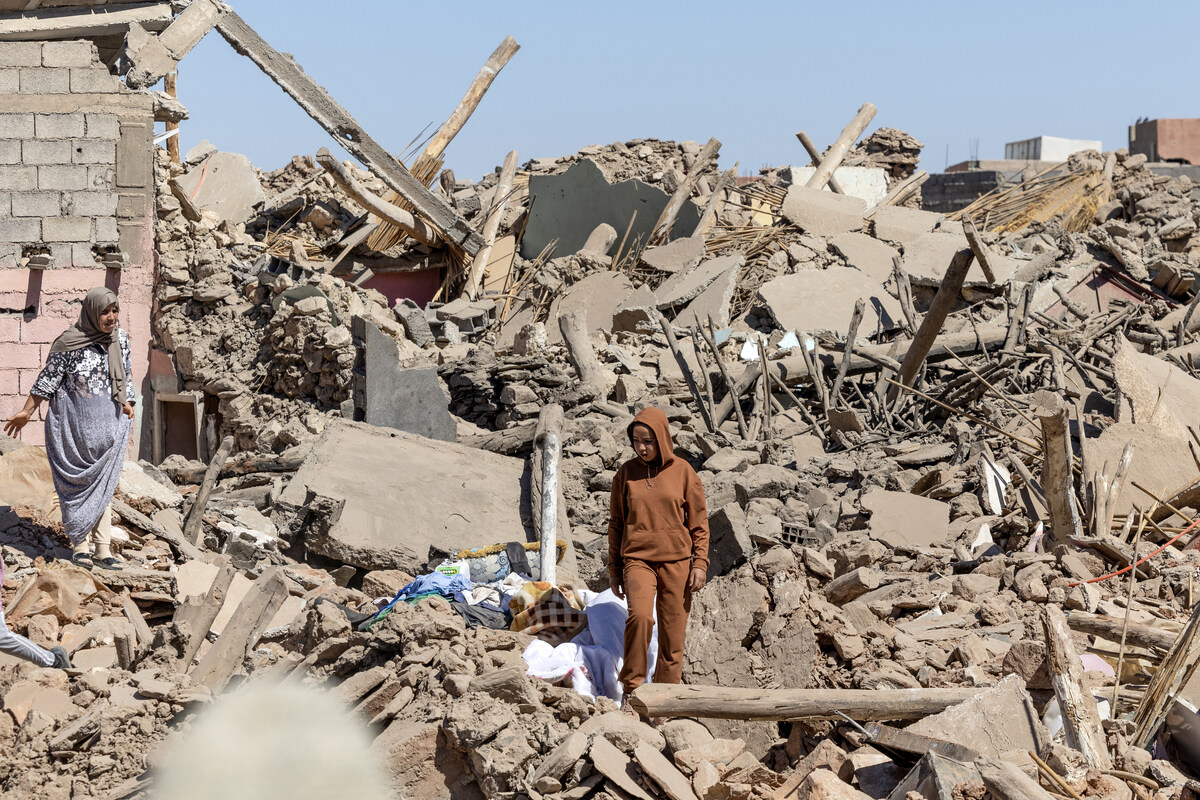
TAFEGHAGHTE, Morocco -- Using heavy equipment and even their bare hands, rescuers in Morocco on Sunday stepped up efforts to find survivors of a devastating earthquake that killed more than 2,100 people and flattened villages.
The first foreign rescuers flew in to help after the North African country's strongest-ever quake killed at least 2,122 people and injured more than 2,400, many seriously, according to official figures updated late on Sunday.
Friday's 6.8-magnitude quake struck 72 kilometres (45 miles) southwest of the tourist hub of Marrakesh, wiping out entire villages in the hills of the Atlas mountains.
On Sunday an aftershock of magnitude 4.5 rattled the same region.
The mountain village of Tafeghaghte, 60 kilometres from Marrakesh, was almost entirely destroyed, an AFP team reported, with very few buildings still standing.
Amid the debris, civilian rescuers and members of Morocco's armed forces searched for survivors and the bodies of the dead.
AFP saw them recover one body from the ruins of a house. Four others were still buried there, residents said.
"Everyone is gone! My heart is broken. I am inconsolable," cried Zahra Benbrik, 62, who said she had lost 18 relatives, with only the body of her brother still trapped.
"I want them to hurry and get him out so I can mourn in peace," she said.
Many houses in remote mountain villages were built from mud bricks.
In the village of Amizmiz, near Tafeghaghte, a backhoe dragged away the heaviest pieces of rubble before rescuers dug into the dusty debris to remove a body that appeared to be under a quilt.
- Crucial hours -
The two villages lie in Al-Haouz province, site of the epicentre, where authorities recorded 1,351 deaths.
According to Moroccan public television, "more than 18,000 families have been affected" by the quake in Al-Haouz.
Citizens on Sunday rushed to hospitals in Marrakesh to donate blood to help the injured.
Spain's defence ministry said an A400 airlifter took off from Zaragoza with 56 rescuers and four search dogs headed for Marrakesh to "help in the search and rescue of survivors".
"We will send whatever is needed because everyone knows that these first hours are key, especially if there are people buried under rubble," Defence Minister Margarita Robles told Spanish public television.
In Marrakesh, resident Fatema Satir had spent two nights sleeping on the streets, like many others fearing their houses might collapse.
"There is no help for us," she said. "Our houses have been cracked, others destroyed -- like my daughter's house which was wiped out. We are in a chaotic state."
In the city's historic Jemaa el-Fna square, about 20 people were huddled on the ground, wrapped in blankets, while others stayed on the lawn of the nearby town hall, its 12th-century ramparts partially collapsed.
The kingdom has declared three days of national mourning.
In addition to Spain, Morocco announced on Sunday it had accepted aid from just three other countries -- Britain, Qatar and the United Arab Emirates.
The interior ministry said in a statement it had responded favourably "at this stage" to offers from the four "to send search and rescue teams".
It said only four offers to help have been accepted because "a lack of coordination could be counterproductive".
Other countries have also offered help.
French President Emmanuel Macron said his country has mobilised "all technical and security teams to be able to intervene, when the Moroccan authorities deem it useful".
Macron, along with Indian Prime Minister Narendra Modi and the heads of the World Bank, International Monetary Fund, African Union and European Commission, also pledged in a joint statement to "mobilise our technical and financial tools and assistance" to help the people of Morocco.
- Long recovery ahead -
The United States said it also had search-and-rescue teams ready to deploy, and Pope Francis on Sunday again expressed support for those affected by the disaster.
"I thank the rescuers and all those who are working to alleviate the suffering of the people," he said from the Vatican window above St Peter's Square.
Algeria, which has long had tense relations with neighbouring Morocco, opened its airspace, which had been closed for two years, to flights carrying humanitarian aid and evacuating the injured.
Israeli Prime Minister Benjamin Netanyahu, whose country in 2020 established ties with Morocco, offered to send search-and-rescue teams, declaring that "Israel stands by Morocco in its difficult time".
The Red Cross warned it could take years to repair the damage.
"It won't be a matter of a week or two... We are counting on a response that will take months, if not years," said Hossam Elsharkawi, its Middle East and North Africa director.
The quake was the deadliest in Morocco since a 1960 earthquake destroyed Agadir, killing more than 12,000 people.